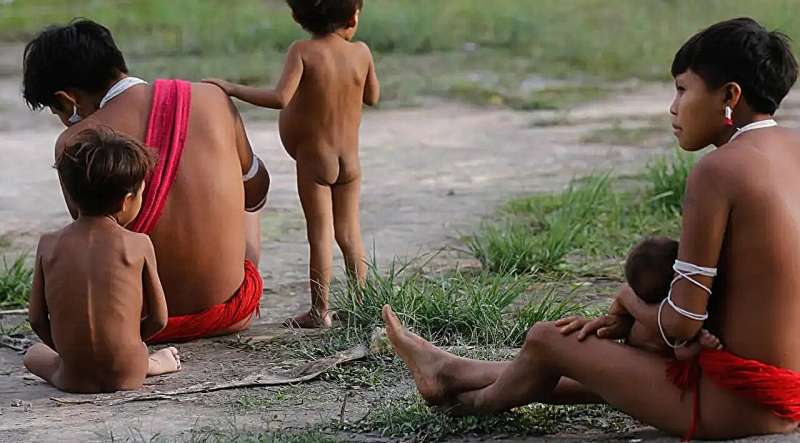Scientists call for urgent action to combat Yanomami food crisis


In 2022, 52.2% of Yanomami under five were undernourished, compared to a global average of 29.1%. Photo credit: Fernando Frazão/Agência Brasil
A harsh denunciation of the poor health of Yanomami children was published in the magazine Natural medicine by researchers at the State University of Campinas (UNICAMP) in Brazil.
The article by Thiago dos Reis Araujo, Ana Paula Davel and Everardo Magalhães Carneiro shows that the children of this ethnic group currently suffer the most from nutritional deficiencies of all indigenous communities in the Americas, that in the last four years about 570 Yanomami children have starved to death and that 52.2% of Yanomami children under five are malnourished, compared to a global average of 29.1%.
The Yanomami territory is the largest indigenous reserve in Brazil. Illegal mining, forest fires and deforestation increased sharply in 2019, without the government of former President Jair Bolsonaro (2019-2022) making any effective attempts to stop them. All of these problems led the federal government to declare a public health emergency there after President Lula took office.
“Urgent measures must be taken to improve the nutritional situation of the Yanomami, said Brazil’s Minister of Indigenous Affairs, Sônia Guajajara. Malnutrition in infancy and early childhood can have lifelong health effects and increase the risk of disease in adulthood. The risk remains even after nutritional rehabilitation,” says Davel.
Magalhães Carneiro explains: “Researchers at the University of Southampton in the UK have proposed the so-called thrifty phenotype hypothesis. According to this hypothesis, individuals who are exposed to poor nutrition during critical periods of their development – including the fetal period in the womb, as well as during lactation and childhood – are likely to have multiple organ malformations or disorders and suffer from disease in adulthood.”
The hypothesis was confirmed by data from the “Dutch Hunger Winter” of 1944–45, when the Nazis cut off food supplies to part of the Netherlands in retaliation for the Dutch government-in-exile’s support of the Allies. In the resulting famine, about 20,000 people died and 4.5 million suffered long-term effects. Babies born at this time or shortly after were stunted and underweight. As they grew, they showed a tendency toward various diseases attributed to malnutrition and a higher than average mortality rate.
“Malnutrition during infancy and early childhood leads to numerous structural and functional changes that make the future adult more likely to suffer from obesity, diabetes, cardiovascular disease, cognitive problems and personality disorders,” says Magalhães Carneiro. This information is very important given the misconception that the effects of malnutrition simply disappear once a starving person is properly fed.
“On the contrary, a change in diet should be carried out with great care. The organism is not yet prepared to metabolize large amounts of nutrients.”
What makes matters worse, the damage caused by chronic malnutrition can be passed on to the next generation. Studies conducted in Manaus and Rio de Janeiro by the Oswaldo Cruz Foundation (Fiocruz), the research and development arm of the Ministry of Health, showed that dwarfism is widespread among Yanomami children, which is linked to the declining height of the mother.
According to the authors, strategic action is “urgently needed to anticipate and mitigate the long-term consequences” of malnutrition on the health of the Yanomami. They call on governments, universities, research institutions and funding agencies to join forces in this direction, stressing that “any nutrition intervention or strategy” must be planned, “culturally adapted” and extended to the areas and communities bordering Yanomami communities.
They also stress the importance of linking health and territory strategies, implementing effective environmental management, controlling mining and other uses of natural resources, and developing socio-environmental compensation measures and policies to protect indigenous territories.
All three authors are affiliated with the Obesity and Comorbidities Research Center (OCRC), a research, innovation, and dissemination center (RIDC).
More information:
Thiago dos Reis Araujo et al, Lifelong health consequences of malnutrition among the Yanomami indigenous population of Brazil, Natural medicine (2024). DOI: 10.1038/s41591-024-02991-y
Quote: Scientists call for urgent action to tackle food crisis ravaging Yanomami (July 11, 2024), accessed July 11, 2024, from https://medicalxpress.com/news/2024-07-scientists-urgent-action-tackle-nutritional.html
This document is subject to copyright. Except for the purposes of private study or research, no part of it may be reproduced without written permission. The contents are for information purposes only.



